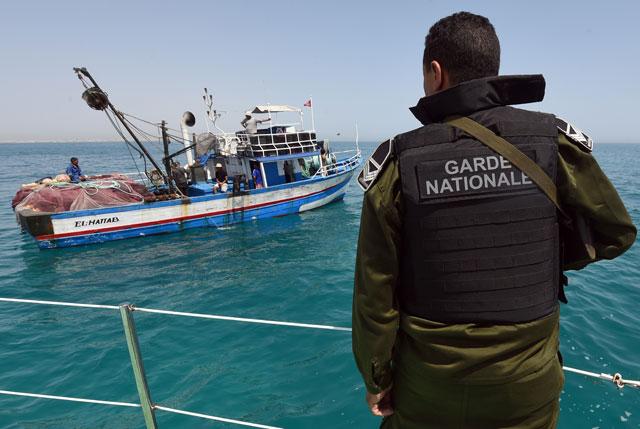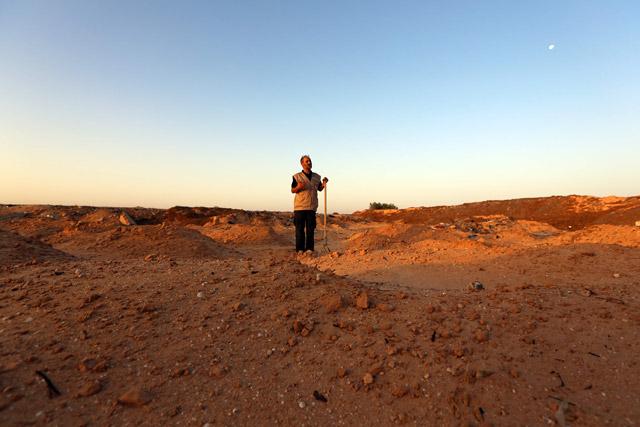You are here
Tunisia battles against the odds to rescue migrants
By AFP - May 11,2015 - Last updated at May 11,2015

ZARZIS, Tunisia — Scanning the horizon with binoculars, Tunisian coastguard Islam Braiek is on the lookout for the growing number of migrants risking their lives crossing the Mediterranean to try to reach Europe.
With the modest means at Tunisia's disposal, it is no mean feat first to detect and then come to the rescue of migrants who get into difficulties, despite the improving weather conditions.
"Lately, saving African migrants coming from Libya has become a real problem," Braiek told AFP on board a patrol vessel off Zarzis in southeast Tunisia.
"We've seen a lot of decomposing bodies floating in the sea since the war in Libya, and I think there'll be more to come," said Lieutenant Mosaad Abichou, the ship's commander.
Tunisian Red Crescent chief Tahar Cheniti said that every other day a boat loaded with migrants hoping for new lives in Europe ends up instead in Tunisia.
"This is the start of the high season... with weather conditions improving and the sea calmer," he told Express FM radio.
Already on high alert along the border because of the chaos and security problems that plague neighbouring Libya, Tunisian authorities are now faced with responding to a growing number of distress calls off their shores.
The country lacks the means, both in manpower and material resources, to deal with them properly.
"But despite all that, we try to do what is needed: recover bodies from the sea, rescue migrants when we can and patrol our coastline," Abichou said.
Often it is local fishermen who first spot the migrants' rickety boats in trouble and who come to their rescue before calling in the coastguard.
"We see very upsetting cases," said Mohamed Belhiba whose trawler saved 32 people in peril at sea at the end of April.
"We save people and take them to Zarzis. But this interrupts our work and we take a lot of risks."
Situation not better ashore
The situation is not much better on land, with the sole official centre for migrants in Ben Guerdane closed for renovation work.
"We really wouldn't know how to cope if we had to put up any more migrants," said Riadh Belhaj, who heads the Red Crescent in Zarzis.
"We can't keep doing things beyond our capacity because our means are limited, just like the number of volunteers."
The rescuers at times have no choice but to rely on the generosity of local residents for food and clothing.
Forced to improvise, the Red Crescent has turned an unfinished building near the centre of Zarzis into a makeshift shelter, where around 40 migrants from Mali and Nigeria kitted out with second-hand blankets await their fate.
"We try to convince them that the solution is to go back home," said Cheniti. "We can't force them... so they stay with us."
Even the deadly risks have not proved a deterrent. Many migrants work on the black market, mostly in construction, to scrape together enough money to pay people traffickers.
"I'd rather be jailed in Italy than free in Nigeria," said Mohamed Eddy, 25, who queued for a plate of lentils cooked by a neighbour.
After lengthy talks with a representative of the International Organisation for Migration, Gary Yari, 16, who was rescued by fishermen as he tried to reach the Italian island of Lampedusa from Libya, reluctantly signed papers for his voluntary return to Mali.
On the telephone, his father's advice was to stay in Tunisia and risk it again.
"I still want to live in Europe. I didn't succeed this time but I can always try again," Yari said secretly.
Related Articles
ZARZIS, Tunisia — Armed with just a spade, Chamseddine Marzoug is determined to give a dignified burial to migrants who drowned in waters of
TUNIS — More than 60 migrants of sub-Saharan origin have been lost at sea off Tunisia since Saturday, after two Europe-bound vessels sank, l
TUNIS — A rescue boat carrying around 75 migrants, most of them from Bangladesh, has been stuck off Tunisia for 12 days after authorities re



















